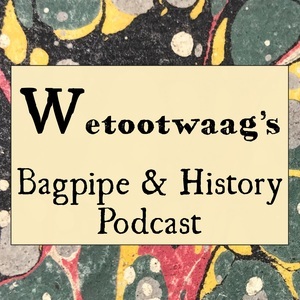S4 E28: Hey Johnny Cock up thy Beaver and A brief History of Slang
October 10th, 2020
1 hr 5 mins 43 secs
Season 4
Your Hosts
Tags
About this Episode
Tunes:
John Playford: Johnny Cock thy Beaver
O’Carolan: Cock up thy Beaver Variations
Dixon: Watty’s Away
Oswald: Johnny Cock-up thy Beaver
Robert Bremner: Scots Bonnet
O’Farrell: The Blue Bonnett
A.L. Lloyd: The Bonny Black Hare
Cover Art from David Allan’s Lead Processing at Leadhills: Weighing the Lead Bars from the 1780s showing a Blue Bonnet and a Cocked hat.
Courtesy of National Galleries Scotland: https://www.nationalgalleries.org/art-and-artists/99127/lead-processing-leadhills-weighing-lead-bars
1686: John Playford, Dancing Master rendition of Johnny Cock thy Beaver here:
https://www.cdss.org/elibrary/dancing-master/Dance/images/Play1138.gif
This whole database was helpful:
https://www.cdss.org/elibrary/dancing-master/Index.htm
1900: I would not have known to look here were it not for John Glen’s monumental work on early Scottish melodies, if you hadn’t noticed it is Glen’s collection that makes up much of the archival copies of these texts I rely on:
https://digital.nls.uk/special-collections-of-printed-music/archive/91349758
<1738 : O’Carolan’s Setting for Variations came likely from Donal O'Sullivan's work of tunes actually composed by Turlough O’Carolan (b.1670-d.1738) I got the transcription (and apparently also a key change) on Vince Brennan’s remarkable website, with ABC copies of all the tunes:
http://www.oldmusicproject.com/occ/tunes.html
1733: William Dixon’s Watty’s Away:
https://www.mattseattle.scot/product-page/the-master-piper-new-edition
1750ish: James Oswald’s Setting for Johnny Cock-up thy Beaver:
https://digital.nls.uk/special-collections-of-printed-music/archive/94599108
1792: Scots Musical Museum (Robert Burns Song)
https://digital.nls.uk/special-collections-of-printed-music/archive/87798244
1757: Bremner’s Setting for Scots Bonnet:
https://digital.nls.uk/special-collections-of-printed-music/archive/105002603
1807-1810: O’Farrell’s setting of The Blue Bonnett:
http://www.cl.cam.ac.uk/~rja14/Papers/ofarrellspc3.pdf It is tune 17 on the PDF
You can read through the fascinating discussion of Beaver and links to many newspaper articles from the early 20th century here on the English Language and Usage Stack Exchange forum: https://english.stackexchange.com/a/503590
June 1922: Missouri Newspaper: Cambridge Students Pride themselves on their whiskers
https://chroniclingamerica.loc.gov/lccn/sn89066316/1922-06-26/ed-1/seq-4/#words=%22yelling%2Bbeaver%22
October 1922: Washington Newspaper: King George may need to shave
https://chroniclingamerica.loc.gov/lccn/sn84026749/1922-10-29/ed-1/seq-59/#words=%22out%2Bbeaver%22
December 1922 Washington Newspaper: Beaver near extinction because of the Beaver Game:
https://chroniclingamerica.loc.gov/lccn/sn84026749/1922-12-03/ed-1/seq-39/#words=%22out%2Bbeaver%22
“Looking For Whiskers
Bearded men find themselves unwontedly popular at Cambridge just now. They are gravely or hilariously saluted by undergraduates with cries of ‘Beaver!’ This is part of a game which the young wits of the University have devised in which pointes are scored by the player who first sights a bearded person.
From Gloucester Citizen, Gloucester, England, Wednesday May 17, 1922 Volume 47, 115
From the Evening Telegraph (Dundee, Scotland) Tuesday october 3, 1922 Day By Day
“There is absolutely no truth in the story that when a Royal figure wearing a beard entered a Cambridge function the undergraduates rose to their feet as one and shouted, ‘Royal beaver game, set, match.”
“When Aussies wore Whiskers from Thursday Aug 2, 1934 Gloucester Citizen, talks about men wearing beards being scorned by barbers, and harassed on the street by cries of Beaver.
Jan 20, 1941 Gloucester Citizen, “Ban on ‘Hitler’ Moustache but ‘Beavers’ are Popular
Discusses how beards fell out of fashion, but are back in for military personnel after WWII.
You can see the “Beaver!” Limerick printed here in the Wordsworth Book of Limericks:
https://archive.org/details/wordsworthbookof0000unse/page/324/mode/1up?
You can see several of the Mid-19th Century Bonny Black Hare Broadsides here, Courtesy of the Bodleian Libraries:
http://ballads.bodleian.ox.ac.uk/search/title/Bonny%20black%20hare
Interesting discussion of Bonny Black Hare from AL Lloyd and others that popularized singing it during the British Folk Revival:
https://mainlynorfolk.info/lloyd/songs/thebonnyblackhare.html
I have lost several hours to Grosse’s 1811 Dictionary of the Vulgar Tongue:
http://www.gutenberg.org/cache/epub/5402/pg5402-images.html
Please take advantage of the Tune Collection tab: https://www.wetootwaag.com/tunesources
Also Please take a minute to leave a review of the podcast!
Listen on Apple Podcasts: https://podcasts.apple.com/us/podcast/wetootwaags-bagpipe-and-history-podcast/id129776677
Listen on Itunes: https://podcasts.apple.com/us/podcast/wetootwaags-bagpipe-and-history-podcast/id129776677
Listen on Spotify: https://open.spotify.com/show/5QxzqrSm0pu6v8y8pLsv5j?si=QLiG0L1pT1eu7B5_FDmgGA
